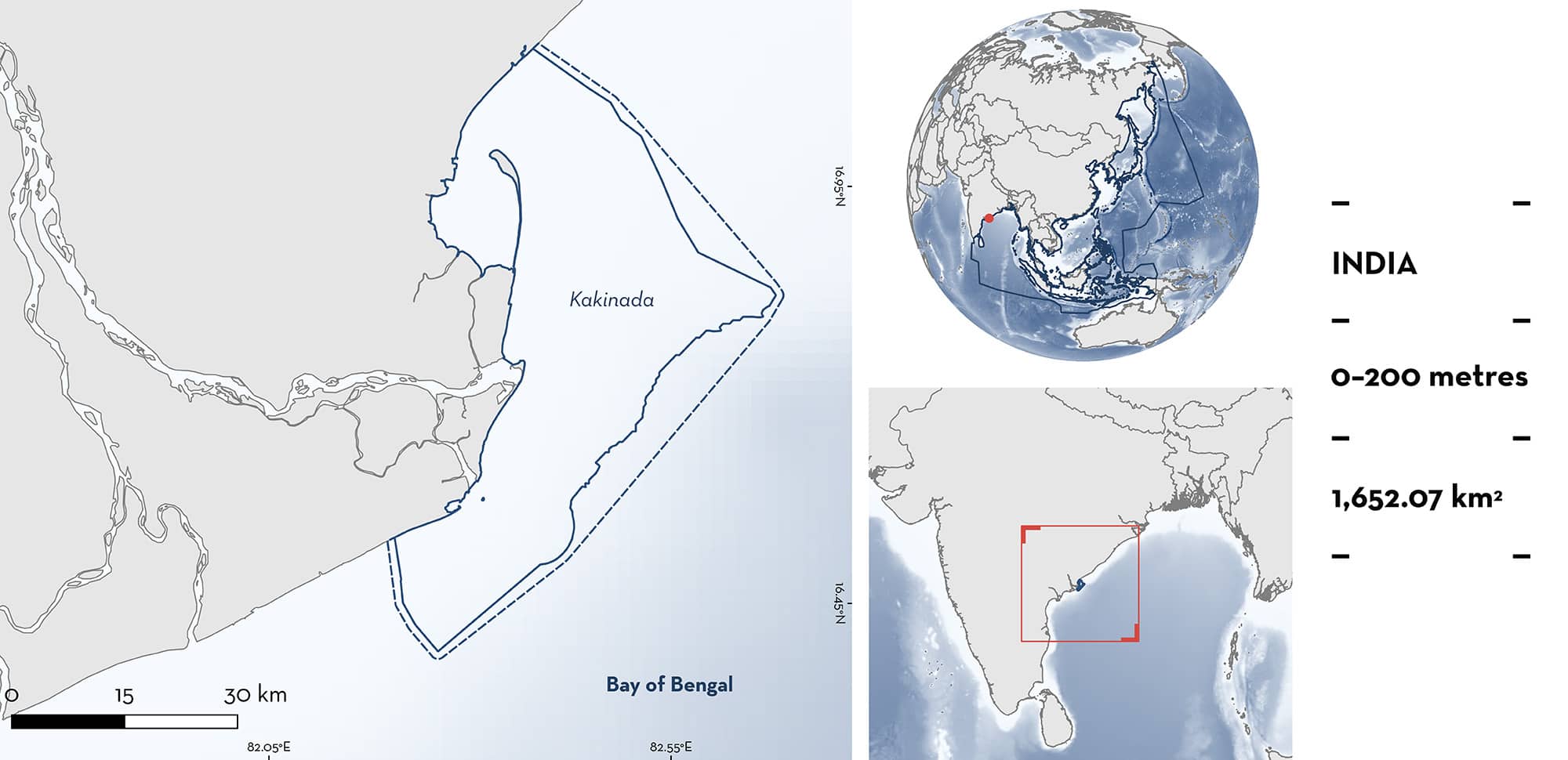ISRA FACTSHEETS
ISRA FACTSHEETS
ASIA REGION
Kakinada
Summary
Kakinada is located on the continental shelf off Andhra Pradesh on the east coast of India. The area is characterised by a narrow shelf and comprises epipelagic waters over sandy or muddy substrates. It is influenced by seasonal monsoons, coastal upwelling, and the advection of upwelled waters offshore which produces high productivity. The area overlaps with the Coringa Wildlife Sanctuary and Godavari Estuary Key Biodiversity Area, and the Coringa Wildlife Sanctuary. Within this area there are: threatened species and undefined aggregations (Whale Shark Rhincodon typus).
Download factsheet
Kakinada
DESCRIPTION OF HABITAT
Kakinada is located on the continental shelf off Andhra Pradesh on the east coast of India. The area sits off the delta of the Godavari River and is adjacent to the East Godavari River Estuarine Ecosystem (EGREE) which encompasses significant areas of mangrove forest (Bagaria et al. 2021). The coastal region surrounding the state of Andhra Pradesh is characterised by a narrow continental shelf of the Bay of Bengal. The area comprises epipelagic waters over sandy or muddy substrates.
The area is characterised by a semi-enclosed basin experiencing seasonally reversing monsoons and severe cyclonic storms. The area has a positive water balance through enormous amounts of freshwater both from precipitation and river runoff from major rivers (Godavari and Krishna) which carry nutrients to the area (Jagadeesan et al. 2023). Cyclonic activity occurs sporadically in the area which agitates sediments in shallow water. This facilitates nutrient injection to the shallow euphotic zone and thereby enhances primary production (Lakshmi et al. 2014). The prominent phytoplankton bloom occurs off Kakinada during the southwest monsoon (June–September) (Thushara & Vinayachandran 2016). Coastal upwelling and the advection of upwelled waters offshore produces high chlorophyll-a concentration in coastal regions and offshore (Rao et al. 1986; Johns et al. 1993; Thushara & Vinayachandran 2016).
Kakinada overlaps with the Coringa Wildlife Sanctuary and Godavari Estuary Key Biodiversity Area (KBA 2024), and the Coringa Wildlife Sanctuary.
This Important Shark and Ray Area is pelagic and is delineated from surface waters (0 m) to 200 m based on the bathymetry of the area.
CRITERION A
VULNERABILITY
One Qualifying Species within the area is considered threatened with extinction according to the IUCN Red List of Threatened Species. The Whale Shark is assessed as Endangered (Pierce & Norman 2016).
CRITERION C
SUB-CRITERION C5 – UNDEFINED AGGREGATIONS
Kakinada is an important area for undefined aggregations of one shark species.
The Andhra Pradesh coast has historically been a hotspot for Whale Sharks in India (Pravin 2000). A Whale Shark conservation programme commenced in 2012 to understand the contemporary occurrence of the species in the region including Kakinada (Sathiyaselvam et al. 2016). This included questionnaire surveys of fisheries experts, researchers, and fishers. Responses indicated that Whale Shark observations appeared to have increased since 2007. Fishers indicated that they mainly saw individual Whale Sharks or small aggregations of 3–5 individuals, although aggregations of 200–300 individuals were also reported, which is a globally significant number (Sathiyaselvam et al. 2016). Whale Sharks are incidentally captured by fishers in all months (apart from a fishing ban from 16 April to 15 June when vessels are not allowed to operate in the area) indicating year-round presence (Sathiyaselvam et al. 2016). Reports of aggregations include coastal waters (~40 m offshore) where Whale Sharks become entangled in shore-seine fishing nets (Sathiyaselvam et al. 2016) as well as further offshore over the continental shelf. Whale Sharks have been protected in India since 2001 and much of the contemporary information on this species along the Andra Pradesh coast comes from opportunistic reports of entanglements and strandings along with interview surveys (Choudhury et al. 2016; Sathiyaselvam et al. 2016); Kakinada represents a hotspot of Whale Shark aggregations within the broader Andra Pradesh coast (Choudhury et al. 2016; Bineesh KK unpubl. data 2024).
The function of Whale Shark aggregations in this area may be related to feeding due to upwelling in Kakinada which produces high productivity (Thushara & Vinayachandran 2016). Local fishers associate the presence of Whale Sharks in the area with feeding activity, given a local language name (bokku sora) refers to how it feeds whilst swimming with its mouth open (Choudhury et al. 2016). However, there is no direct research on Whale Shark feeding in the area.
Whale Shark aggregations may also be related to reproduction given recent records of neonate Whale Sharks in the area. Reproductive areas, such as mating and pupping grounds, are among the lesser-known attributes of Whale Shark life history and only a very limited number of individuals measuring <150 cm total length (TL) have been reported globally (Miranda et al. 2021). The recent neonate records from the area comprise two individuals of 76–82 cm TL, one from 12 January 2024 caught ~5 km off the city of Kakinada, and one from 8 March 2024 caught 4 km off the city (Sweta B unpubl. data 2024). The reported size-at-birth of the species is 55–64 cm TL (Ebert et al. 2021). While it appears that Whale Sharks may be utilising the area for feeding and reproduction, further information is required to understand the nature and function of these aggregations.
Download factsheet
SUBMIT A REQUEST
ISRA SPATIAL LAYER REQUEST
To make a request to download the ISRA Layer in either a GIS compatible Shapefile (.shp) or Google Earth compatible Keyhole Markup Language Zipped file (.kmz) please complete the following form. We will review your request and send the download details to you. We will endeavor to send you the requested files as soon as we can. However, please note that this is not an automated process, and before requests are responded to, they undergo internal review and authorization. As such, requests normally take 5–10 working days to process.
Should you have questions about the data or process, please do not hesitate to contact us.


